University Taxation Law Assignment: LAWS20060, Term 1, 2019
VerifiedAdded on 2023/01/03
|13
|3753
|76
Homework Assignment
AI Summary
This assignment provides a comprehensive analysis of Australian taxation law, addressing key concepts such as depreciating assets, tax offsets, marginal and average tax rates, and consumption tax. The assignment includes detailed answers to questions on allowable deductions under section 8.1 of the Income Tax Assessment Act 1997, examining scenarios involving business expenses, personal use of assets, and losses. It further explores Capital Gains Tax (CGT) events, including lease agreements, property rights, and residential exemptions, along with a CGT computation example. The solutions are supported by references to relevant legislation, including the Income Tax Assessment Act 1997 and Taxation Rulings, and adhere to the Australian Guide to Legal Citation (AGLC) 3rd Edition. The assignment aims to demonstrate a strong understanding of taxation principles and their practical application.
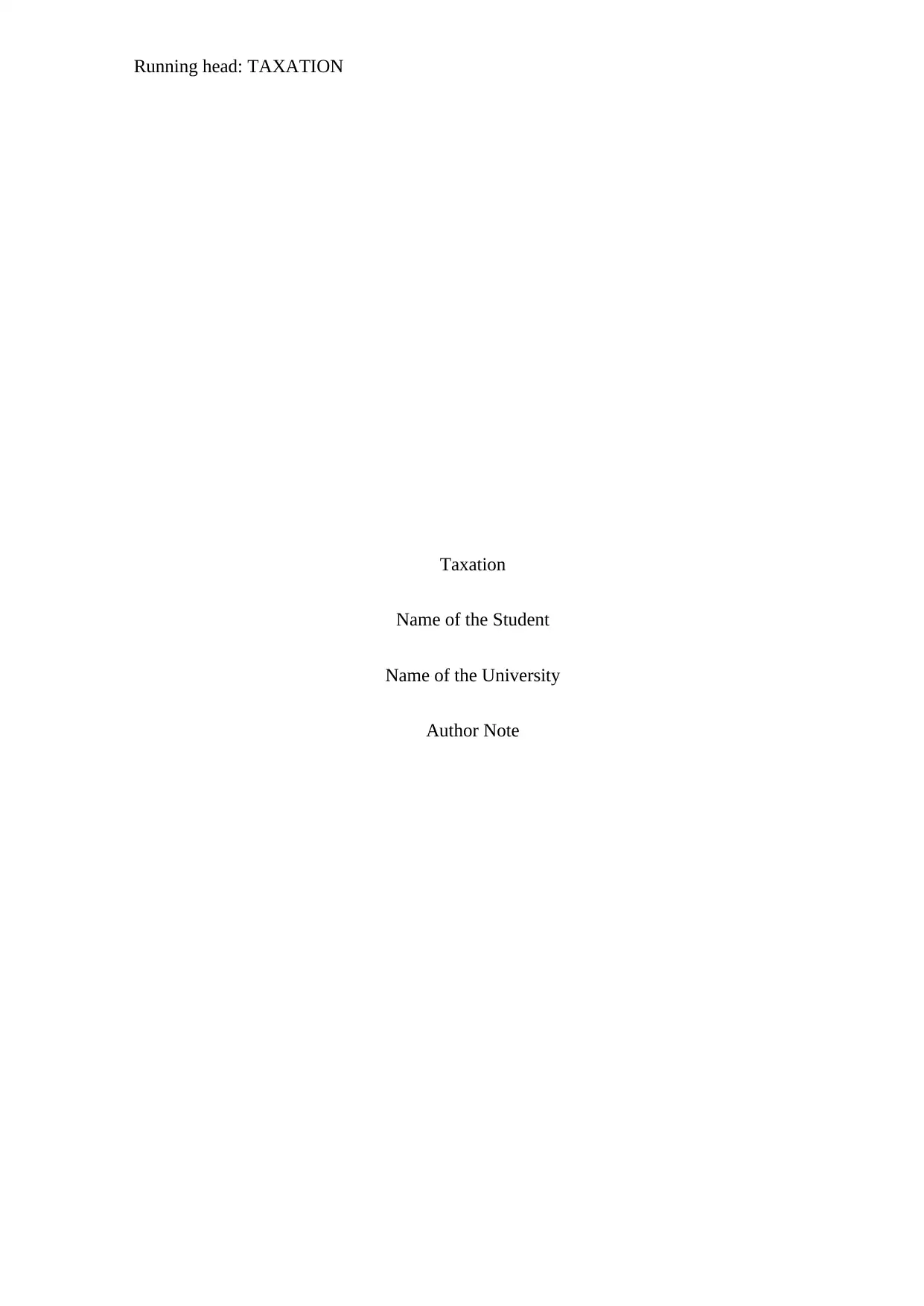
Running head: TAXATION
Taxation
Name of the Student
Name of the University
Author Note
Taxation
Name of the Student
Name of the University
Author Note
Paraphrase This Document
Need a fresh take? Get an instant paraphrase of this document with our AI Paraphraser

1TAXATION
Question 1
a)
The assessment of depreciating asset has been covered by the Taxation Ruling TR
2018/41 and prescribes the technique with which the Commissioner is required to compute
the same.
b)
The available offsets relating to taxation has been covered by Div. 13 of the Income
Tax Assessment Act 1997 (Cth)2.
c)
The maximum rate of tax that is applied to a taxpayer is 54,097 and a 45% above the
taxable income that needs to be charged over any income above 180,000.
d)
A permanent resident is an exemption from CGT under the Income Tax Assessment
Act 1997 (Cth), section 118.103.
e)
Under B1 s104.15 of the Income Tax Assessment Act 1997 (Cth)4, the right
pertaining to a tax payer in relation to a use and the enjoyment of a property before the
passing over of the title of ownership is to be taxed.
f)
1 The Taxation Ruling TR 2018/4
2 The Income Tax Assessment Act 1997 (Cth), div 13
3 The Income Tax Assessment Act 1997 (Cth), s. 118.10
4 The Income Tax Assessment Act 1997 (Cth), s. 104.15
Question 1
a)
The assessment of depreciating asset has been covered by the Taxation Ruling TR
2018/41 and prescribes the technique with which the Commissioner is required to compute
the same.
b)
The available offsets relating to taxation has been covered by Div. 13 of the Income
Tax Assessment Act 1997 (Cth)2.
c)
The maximum rate of tax that is applied to a taxpayer is 54,097 and a 45% above the
taxable income that needs to be charged over any income above 180,000.
d)
A permanent resident is an exemption from CGT under the Income Tax Assessment
Act 1997 (Cth), section 118.103.
e)
Under B1 s104.15 of the Income Tax Assessment Act 1997 (Cth)4, the right
pertaining to a tax payer in relation to a use and the enjoyment of a property before the
passing over of the title of ownership is to be taxed.
f)
1 The Taxation Ruling TR 2018/4
2 The Income Tax Assessment Act 1997 (Cth), div 13
3 The Income Tax Assessment Act 1997 (Cth), s. 118.10
4 The Income Tax Assessment Act 1997 (Cth), s. 104.15

2TAXATION
Income Tax payable by a taxpayer is required to be calculated by multiplying the tax
rate with the total income and then deducting the tax offsets from the same. This formula has
been provided under section 4.10(3) of the Income Tax Assessment Act 1997 (Cth)5.
g)
The High Court contended in the case of FC of T v Day 2008 ATC 20-0646, that any
expense that a taxpayer incurs in the due process of the generation of taxable income, needs
to be permitted as a deduction under section 8.1 of Income Tax Assessment Act 1997 (Cth)7.
Before the judgement, there has been a contention among the courts that all expenses that can
be connected to a domestic purpose cannot be treated as a deduction under section 8.1.
However, after this decision it has been contended by the court that even if it has a domestic
purpose, the slightest connection of it with the income generation process will render it to be
allowed as a deduction under section 8.1. However, this deduction is only available to that
extent or part of the expenditure that has contributed in the process of income generation.
h)
Marginal tax rate is a rate of tax that needs to be applied in the increment that occurs
upon the total income of a person. On the other hand, average rate of tax is the rate of tax that
is required to be applied over the entire income of a person. The difference lies in the
calculation and the destination of these tax rates. In case of marginal rate of tax, the
calculation needs to be carried out upon the instrument that has been caused to the total
income of a person. However, average rate of tax is to be calculated over the total income of
a person that is taxable. This can be construed as the fact that average rate of tax is to be
imposed upon the total taxable income of a person and the marginal rate of tax is to be
imposed only with upon the increment that the taxable income of a person suffers.
5 The Income Tax Assessment Act 1997 (Cth) s. 4.10(3)
6 FC of T v Day 2008 ATC 20-064
7 The Income Tax Assessment Act 1997 (Cth), s. 8.1
Income Tax payable by a taxpayer is required to be calculated by multiplying the tax
rate with the total income and then deducting the tax offsets from the same. This formula has
been provided under section 4.10(3) of the Income Tax Assessment Act 1997 (Cth)5.
g)
The High Court contended in the case of FC of T v Day 2008 ATC 20-0646, that any
expense that a taxpayer incurs in the due process of the generation of taxable income, needs
to be permitted as a deduction under section 8.1 of Income Tax Assessment Act 1997 (Cth)7.
Before the judgement, there has been a contention among the courts that all expenses that can
be connected to a domestic purpose cannot be treated as a deduction under section 8.1.
However, after this decision it has been contended by the court that even if it has a domestic
purpose, the slightest connection of it with the income generation process will render it to be
allowed as a deduction under section 8.1. However, this deduction is only available to that
extent or part of the expenditure that has contributed in the process of income generation.
h)
Marginal tax rate is a rate of tax that needs to be applied in the increment that occurs
upon the total income of a person. On the other hand, average rate of tax is the rate of tax that
is required to be applied over the entire income of a person. The difference lies in the
calculation and the destination of these tax rates. In case of marginal rate of tax, the
calculation needs to be carried out upon the instrument that has been caused to the total
income of a person. However, average rate of tax is to be calculated over the total income of
a person that is taxable. This can be construed as the fact that average rate of tax is to be
imposed upon the total taxable income of a person and the marginal rate of tax is to be
imposed only with upon the increment that the taxable income of a person suffers.
5 The Income Tax Assessment Act 1997 (Cth) s. 4.10(3)
6 FC of T v Day 2008 ATC 20-064
7 The Income Tax Assessment Act 1997 (Cth), s. 8.1
⊘ This is a preview!⊘
Do you want full access?
Subscribe today to unlock all pages.

Trusted by 1+ million students worldwide
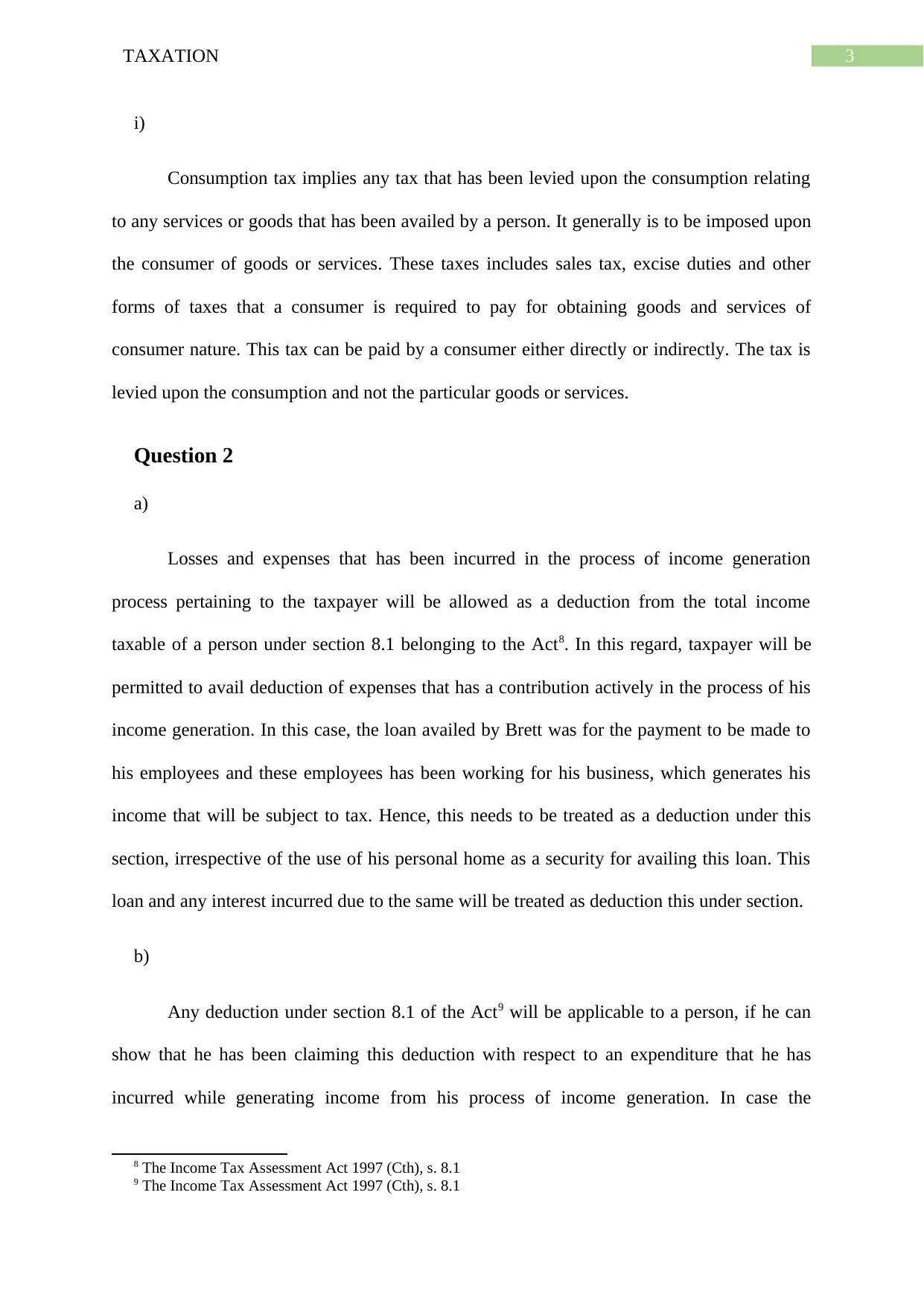
3TAXATION
i)
Consumption tax implies any tax that has been levied upon the consumption relating
to any services or goods that has been availed by a person. It generally is to be imposed upon
the consumer of goods or services. These taxes includes sales tax, excise duties and other
forms of taxes that a consumer is required to pay for obtaining goods and services of
consumer nature. This tax can be paid by a consumer either directly or indirectly. The tax is
levied upon the consumption and not the particular goods or services.
Question 2
a)
Losses and expenses that has been incurred in the process of income generation
process pertaining to the taxpayer will be allowed as a deduction from the total income
taxable of a person under section 8.1 belonging to the Act8. In this regard, taxpayer will be
permitted to avail deduction of expenses that has a contribution actively in the process of his
income generation. In this case, the loan availed by Brett was for the payment to be made to
his employees and these employees has been working for his business, which generates his
income that will be subject to tax. Hence, this needs to be treated as a deduction under this
section, irrespective of the use of his personal home as a security for availing this loan. This
loan and any interest incurred due to the same will be treated as deduction this under section.
b)
Any deduction under section 8.1 of the Act9 will be applicable to a person, if he can
show that he has been claiming this deduction with respect to an expenditure that he has
incurred while generating income from his process of income generation. In case the
8 The Income Tax Assessment Act 1997 (Cth), s. 8.1
9 The Income Tax Assessment Act 1997 (Cth), s. 8.1
i)
Consumption tax implies any tax that has been levied upon the consumption relating
to any services or goods that has been availed by a person. It generally is to be imposed upon
the consumer of goods or services. These taxes includes sales tax, excise duties and other
forms of taxes that a consumer is required to pay for obtaining goods and services of
consumer nature. This tax can be paid by a consumer either directly or indirectly. The tax is
levied upon the consumption and not the particular goods or services.
Question 2
a)
Losses and expenses that has been incurred in the process of income generation
process pertaining to the taxpayer will be allowed as a deduction from the total income
taxable of a person under section 8.1 belonging to the Act8. In this regard, taxpayer will be
permitted to avail deduction of expenses that has a contribution actively in the process of his
income generation. In this case, the loan availed by Brett was for the payment to be made to
his employees and these employees has been working for his business, which generates his
income that will be subject to tax. Hence, this needs to be treated as a deduction under this
section, irrespective of the use of his personal home as a security for availing this loan. This
loan and any interest incurred due to the same will be treated as deduction this under section.
b)
Any deduction under section 8.1 of the Act9 will be applicable to a person, if he can
show that he has been claiming this deduction with respect to an expenditure that he has
incurred while generating income from his process of income generation. In case the
8 The Income Tax Assessment Act 1997 (Cth), s. 8.1
9 The Income Tax Assessment Act 1997 (Cth), s. 8.1
Paraphrase This Document
Need a fresh take? Get an instant paraphrase of this document with our AI Paraphraser
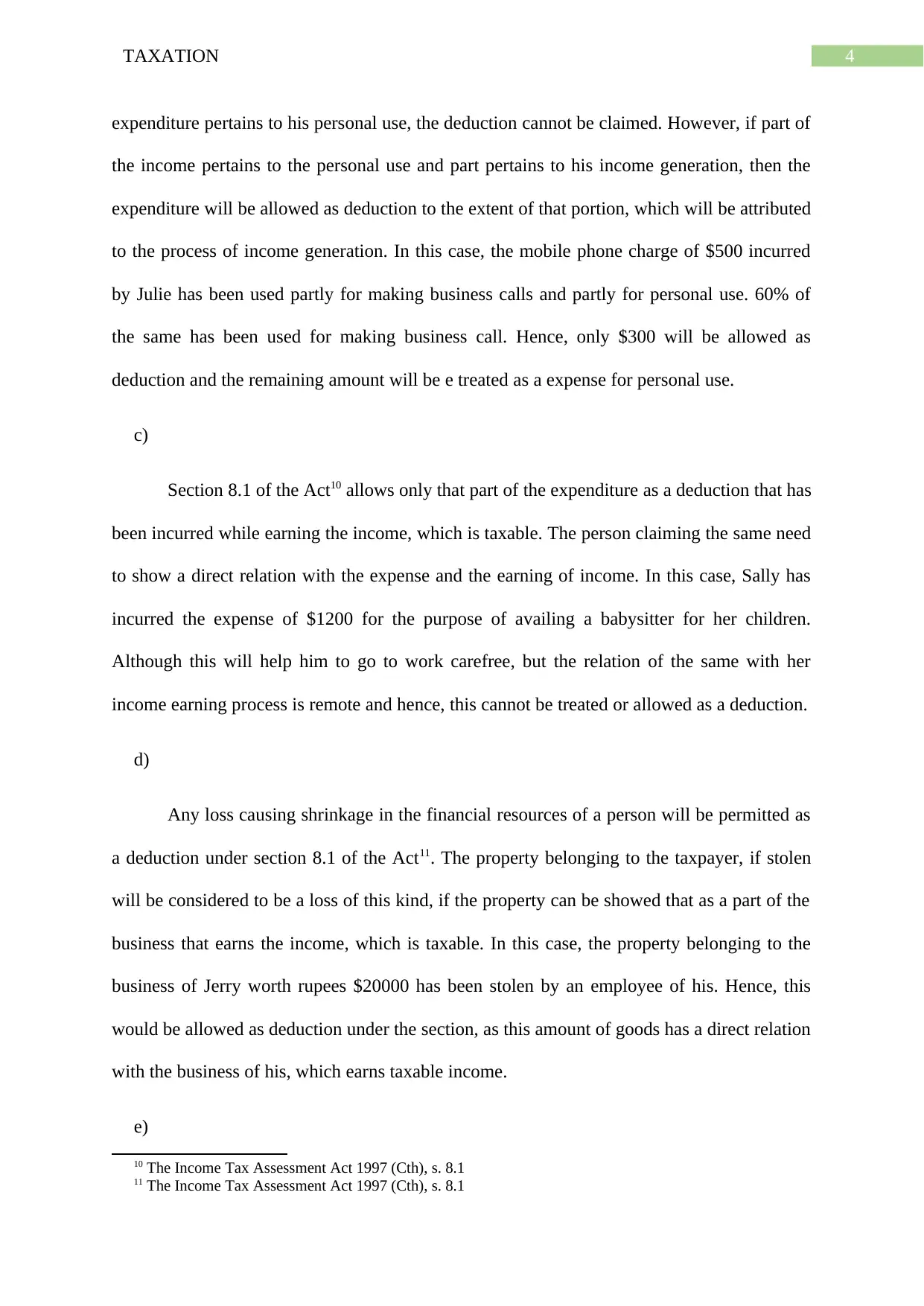
4TAXATION
expenditure pertains to his personal use, the deduction cannot be claimed. However, if part of
the income pertains to the personal use and part pertains to his income generation, then the
expenditure will be allowed as deduction to the extent of that portion, which will be attributed
to the process of income generation. In this case, the mobile phone charge of $500 incurred
by Julie has been used partly for making business calls and partly for personal use. 60% of
the same has been used for making business call. Hence, only $300 will be allowed as
deduction and the remaining amount will be e treated as a expense for personal use.
c)
Section 8.1 of the Act10 allows only that part of the expenditure as a deduction that has
been incurred while earning the income, which is taxable. The person claiming the same need
to show a direct relation with the expense and the earning of income. In this case, Sally has
incurred the expense of $1200 for the purpose of availing a babysitter for her children.
Although this will help him to go to work carefree, but the relation of the same with her
income earning process is remote and hence, this cannot be treated or allowed as a deduction.
d)
Any loss causing shrinkage in the financial resources of a person will be permitted as
a deduction under section 8.1 of the Act11. The property belonging to the taxpayer, if stolen
will be considered to be a loss of this kind, if the property can be showed that as a part of the
business that earns the income, which is taxable. In this case, the property belonging to the
business of Jerry worth rupees $20000 has been stolen by an employee of his. Hence, this
would be allowed as deduction under the section, as this amount of goods has a direct relation
with the business of his, which earns taxable income.
e)
10 The Income Tax Assessment Act 1997 (Cth), s. 8.1
11 The Income Tax Assessment Act 1997 (Cth), s. 8.1
expenditure pertains to his personal use, the deduction cannot be claimed. However, if part of
the income pertains to the personal use and part pertains to his income generation, then the
expenditure will be allowed as deduction to the extent of that portion, which will be attributed
to the process of income generation. In this case, the mobile phone charge of $500 incurred
by Julie has been used partly for making business calls and partly for personal use. 60% of
the same has been used for making business call. Hence, only $300 will be allowed as
deduction and the remaining amount will be e treated as a expense for personal use.
c)
Section 8.1 of the Act10 allows only that part of the expenditure as a deduction that has
been incurred while earning the income, which is taxable. The person claiming the same need
to show a direct relation with the expense and the earning of income. In this case, Sally has
incurred the expense of $1200 for the purpose of availing a babysitter for her children.
Although this will help him to go to work carefree, but the relation of the same with her
income earning process is remote and hence, this cannot be treated or allowed as a deduction.
d)
Any loss causing shrinkage in the financial resources of a person will be permitted as
a deduction under section 8.1 of the Act11. The property belonging to the taxpayer, if stolen
will be considered to be a loss of this kind, if the property can be showed that as a part of the
business that earns the income, which is taxable. In this case, the property belonging to the
business of Jerry worth rupees $20000 has been stolen by an employee of his. Hence, this
would be allowed as deduction under the section, as this amount of goods has a direct relation
with the business of his, which earns taxable income.
e)
10 The Income Tax Assessment Act 1997 (Cth), s. 8.1
11 The Income Tax Assessment Act 1997 (Cth), s. 8.1

5TAXATION
The endeavour or venture, which has the prospect of earning taxable income in the future
might include certain expenses, but the same will not be permitted to be deducted from his
taxable income under section 8.1 of the Act12. Expenditure incurred by the taxpayer for the
investment he made in a big party contesting in election for the local government will not be
treated as a deduction. Hence, in this case, $5000 along with $2,000 will not be treated as a
deduction under this section, as it does not put into the income generation process. But it is an
expense incurred in the preparation of a prospect of income.
Question 3
a)
In case property is leased by the owner of the same or even subleased, by the owner,
the same will fall under the category of CGT event F2. This category will also be applicable
in case of grant, renewal or even an extension of a lease already existing. In this class of CGT
event, any gain that might accrue from the same, will not be applied with the 50% discount
rule. Consequently, in case of Andy, the owner of the land, has granted the least to Brian for a
period of 5 years. The premium he charged amounted to $5,000. Being the owner of the land
and leasing it out, will bring the case under the CGT event F2 and owing to this no discount
of 50% will be allowed in the premium under Div 115 of the Act13.
b)
Under B1 s104.15 of the Income Tax Assessment Act 1997 (Cth)14, the right
pertaining to a taxpayer in relation to a use and the enjoyment of a property before the
passing over of the title of ownership is to be taxed. Under this category of CGT event, the
discount of 50% will be allowed under Div 115 of the Act. In the present case, John has been
12 The Income Tax Assessment Act 1997 (Cth), s. 8.1
13 The Income Tax Assessment Act 1997 (Cth), div 115
14 The Income Tax Assessment Act 1997 (Cth), s. 104.15
The endeavour or venture, which has the prospect of earning taxable income in the future
might include certain expenses, but the same will not be permitted to be deducted from his
taxable income under section 8.1 of the Act12. Expenditure incurred by the taxpayer for the
investment he made in a big party contesting in election for the local government will not be
treated as a deduction. Hence, in this case, $5000 along with $2,000 will not be treated as a
deduction under this section, as it does not put into the income generation process. But it is an
expense incurred in the preparation of a prospect of income.
Question 3
a)
In case property is leased by the owner of the same or even subleased, by the owner,
the same will fall under the category of CGT event F2. This category will also be applicable
in case of grant, renewal or even an extension of a lease already existing. In this class of CGT
event, any gain that might accrue from the same, will not be applied with the 50% discount
rule. Consequently, in case of Andy, the owner of the land, has granted the least to Brian for a
period of 5 years. The premium he charged amounted to $5,000. Being the owner of the land
and leasing it out, will bring the case under the CGT event F2 and owing to this no discount
of 50% will be allowed in the premium under Div 115 of the Act13.
b)
Under B1 s104.15 of the Income Tax Assessment Act 1997 (Cth)14, the right
pertaining to a taxpayer in relation to a use and the enjoyment of a property before the
passing over of the title of ownership is to be taxed. Under this category of CGT event, the
discount of 50% will be allowed under Div 115 of the Act. In the present case, John has been
12 The Income Tax Assessment Act 1997 (Cth), s. 8.1
13 The Income Tax Assessment Act 1997 (Cth), div 115
14 The Income Tax Assessment Act 1997 (Cth), s. 104.15
⊘ This is a preview!⊘
Do you want full access?
Subscribe today to unlock all pages.

Trusted by 1+ million students worldwide
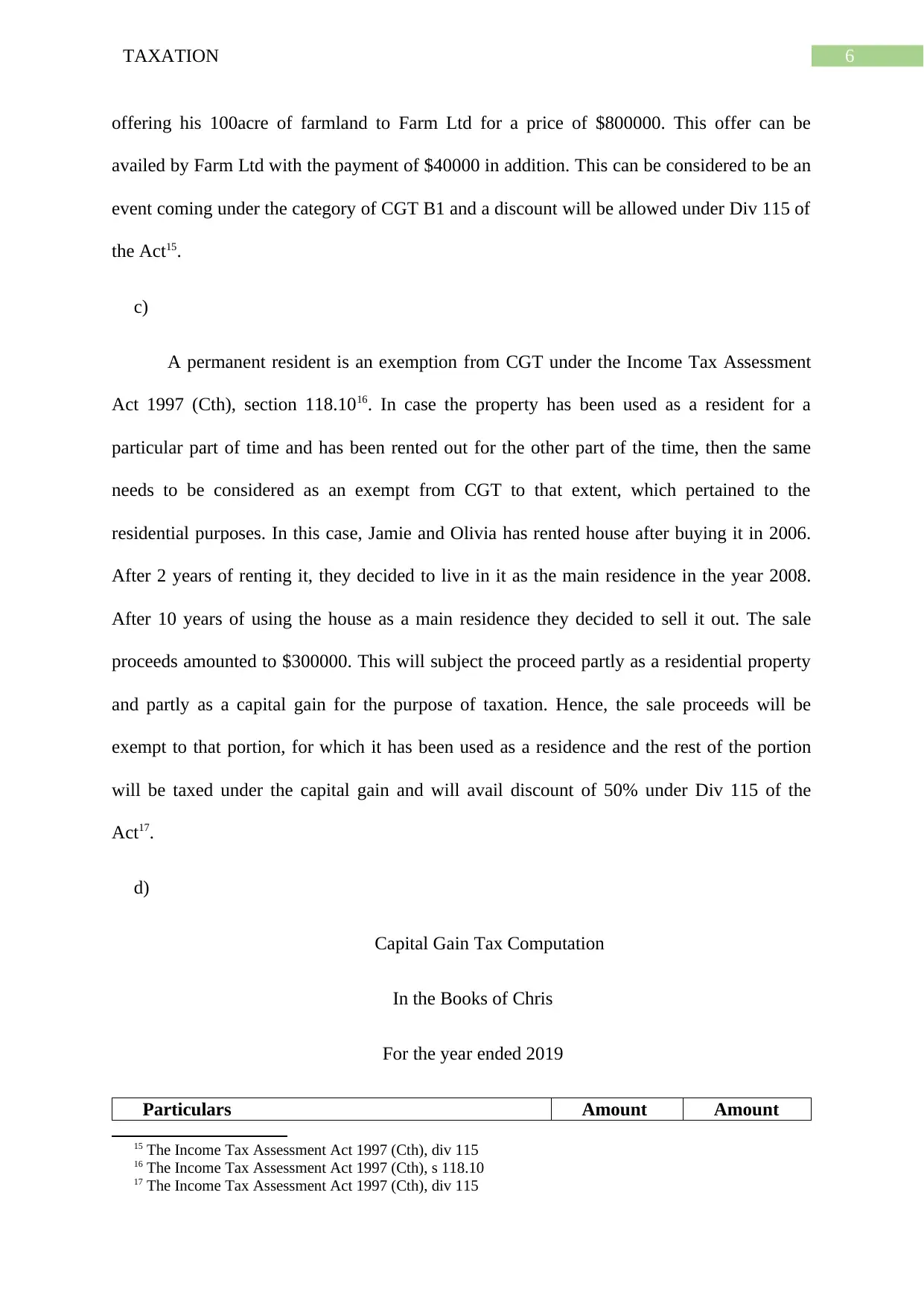
6TAXATION
offering his 100acre of farmland to Farm Ltd for a price of $800000. This offer can be
availed by Farm Ltd with the payment of $40000 in addition. This can be considered to be an
event coming under the category of CGT B1 and a discount will be allowed under Div 115 of
the Act15.
c)
A permanent resident is an exemption from CGT under the Income Tax Assessment
Act 1997 (Cth), section 118.1016. In case the property has been used as a resident for a
particular part of time and has been rented out for the other part of the time, then the same
needs to be considered as an exempt from CGT to that extent, which pertained to the
residential purposes. In this case, Jamie and Olivia has rented house after buying it in 2006.
After 2 years of renting it, they decided to live in it as the main residence in the year 2008.
After 10 years of using the house as a main residence they decided to sell it out. The sale
proceeds amounted to $300000. This will subject the proceed partly as a residential property
and partly as a capital gain for the purpose of taxation. Hence, the sale proceeds will be
exempt to that portion, for which it has been used as a residence and the rest of the portion
will be taxed under the capital gain and will avail discount of 50% under Div 115 of the
Act17.
d)
Capital Gain Tax Computation
In the Books of Chris
For the year ended 2019
Particulars Amount Amount
15 The Income Tax Assessment Act 1997 (Cth), div 115
16 The Income Tax Assessment Act 1997 (Cth), s 118.10
17 The Income Tax Assessment Act 1997 (Cth), div 115
offering his 100acre of farmland to Farm Ltd for a price of $800000. This offer can be
availed by Farm Ltd with the payment of $40000 in addition. This can be considered to be an
event coming under the category of CGT B1 and a discount will be allowed under Div 115 of
the Act15.
c)
A permanent resident is an exemption from CGT under the Income Tax Assessment
Act 1997 (Cth), section 118.1016. In case the property has been used as a resident for a
particular part of time and has been rented out for the other part of the time, then the same
needs to be considered as an exempt from CGT to that extent, which pertained to the
residential purposes. In this case, Jamie and Olivia has rented house after buying it in 2006.
After 2 years of renting it, they decided to live in it as the main residence in the year 2008.
After 10 years of using the house as a main residence they decided to sell it out. The sale
proceeds amounted to $300000. This will subject the proceed partly as a residential property
and partly as a capital gain for the purpose of taxation. Hence, the sale proceeds will be
exempt to that portion, for which it has been used as a residence and the rest of the portion
will be taxed under the capital gain and will avail discount of 50% under Div 115 of the
Act17.
d)
Capital Gain Tax Computation
In the Books of Chris
For the year ended 2019
Particulars Amount Amount
15 The Income Tax Assessment Act 1997 (Cth), div 115
16 The Income Tax Assessment Act 1997 (Cth), s 118.10
17 The Income Tax Assessment Act 1997 (Cth), div 115
Paraphrase This Document
Need a fresh take? Get an instant paraphrase of this document with our AI Paraphraser
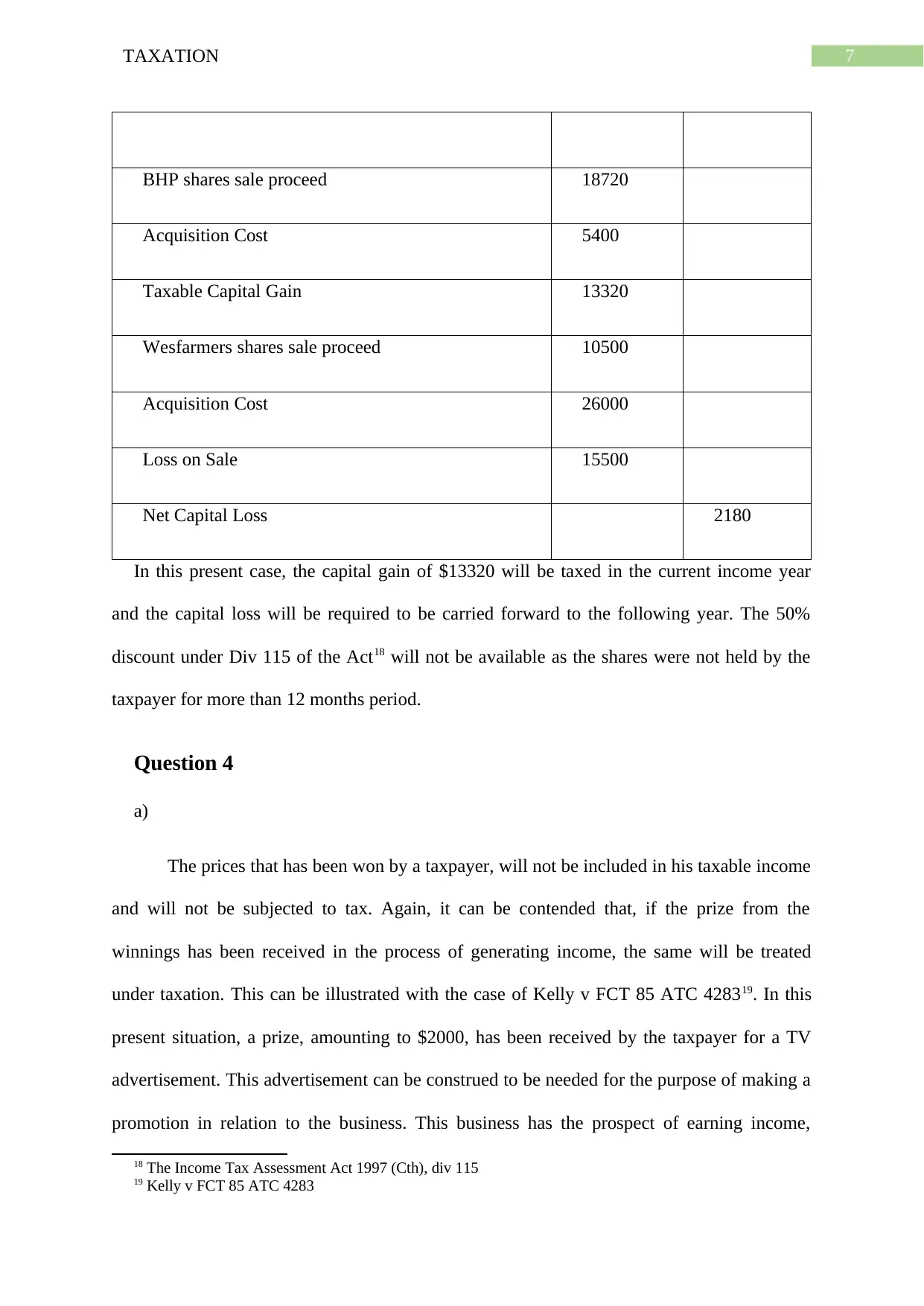
7TAXATION
BHP shares sale proceed 18720
Acquisition Cost 5400
Taxable Capital Gain 13320
Wesfarmers shares sale proceed 10500
Acquisition Cost 26000
Loss on Sale 15500
Net Capital Loss 2180
In this present case, the capital gain of $13320 will be taxed in the current income year
and the capital loss will be required to be carried forward to the following year. The 50%
discount under Div 115 of the Act18 will not be available as the shares were not held by the
taxpayer for more than 12 months period.
Question 4
a)
The prices that has been won by a taxpayer, will not be included in his taxable income
and will not be subjected to tax. Again, it can be contended that, if the prize from the
winnings has been received in the process of generating income, the same will be treated
under taxation. This can be illustrated with the case of Kelly v FCT 85 ATC 428319. In this
present situation, a prize, amounting to $2000, has been received by the taxpayer for a TV
advertisement. This advertisement can be construed to be needed for the purpose of making a
promotion in relation to the business. This business has the prospect of earning income,
18 The Income Tax Assessment Act 1997 (Cth), div 115
19 Kelly v FCT 85 ATC 4283
BHP shares sale proceed 18720
Acquisition Cost 5400
Taxable Capital Gain 13320
Wesfarmers shares sale proceed 10500
Acquisition Cost 26000
Loss on Sale 15500
Net Capital Loss 2180
In this present case, the capital gain of $13320 will be taxed in the current income year
and the capital loss will be required to be carried forward to the following year. The 50%
discount under Div 115 of the Act18 will not be available as the shares were not held by the
taxpayer for more than 12 months period.
Question 4
a)
The prices that has been won by a taxpayer, will not be included in his taxable income
and will not be subjected to tax. Again, it can be contended that, if the prize from the
winnings has been received in the process of generating income, the same will be treated
under taxation. This can be illustrated with the case of Kelly v FCT 85 ATC 428319. In this
present situation, a prize, amounting to $2000, has been received by the taxpayer for a TV
advertisement. This advertisement can be construed to be needed for the purpose of making a
promotion in relation to the business. This business has the prospect of earning income,
18 The Income Tax Assessment Act 1997 (Cth), div 115
19 Kelly v FCT 85 ATC 4283
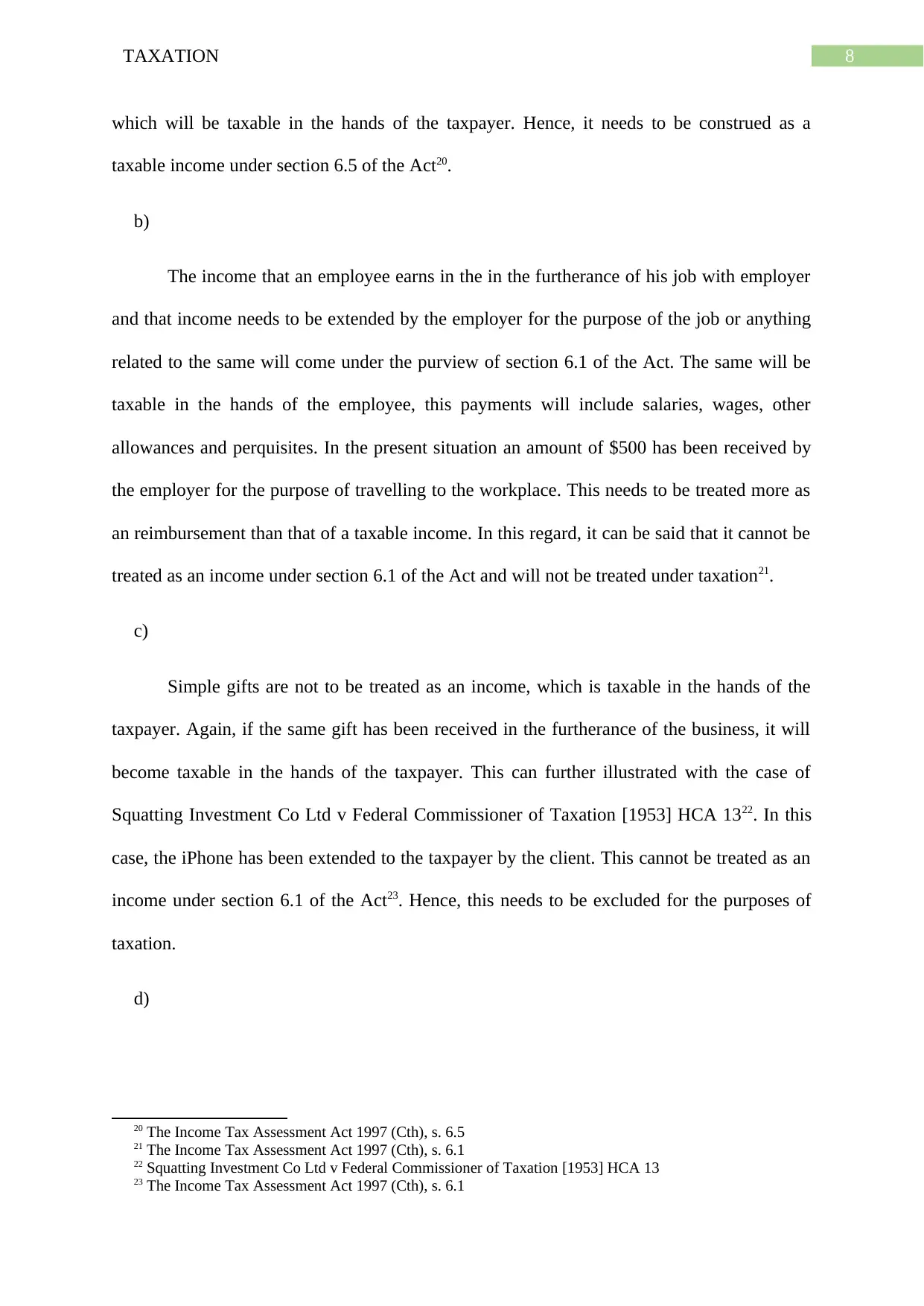
8TAXATION
which will be taxable in the hands of the taxpayer. Hence, it needs to be construed as a
taxable income under section 6.5 of the Act20.
b)
The income that an employee earns in the in the furtherance of his job with employer
and that income needs to be extended by the employer for the purpose of the job or anything
related to the same will come under the purview of section 6.1 of the Act. The same will be
taxable in the hands of the employee, this payments will include salaries, wages, other
allowances and perquisites. In the present situation an amount of $500 has been received by
the employer for the purpose of travelling to the workplace. This needs to be treated more as
an reimbursement than that of a taxable income. In this regard, it can be said that it cannot be
treated as an income under section 6.1 of the Act and will not be treated under taxation21.
c)
Simple gifts are not to be treated as an income, which is taxable in the hands of the
taxpayer. Again, if the same gift has been received in the furtherance of the business, it will
become taxable in the hands of the taxpayer. This can further illustrated with the case of
Squatting Investment Co Ltd v Federal Commissioner of Taxation [1953] HCA 1322. In this
case, the iPhone has been extended to the taxpayer by the client. This cannot be treated as an
income under section 6.1 of the Act23. Hence, this needs to be excluded for the purposes of
taxation.
d)
20 The Income Tax Assessment Act 1997 (Cth), s. 6.5
21 The Income Tax Assessment Act 1997 (Cth), s. 6.1
22 Squatting Investment Co Ltd v Federal Commissioner of Taxation [1953] HCA 13
23 The Income Tax Assessment Act 1997 (Cth), s. 6.1
which will be taxable in the hands of the taxpayer. Hence, it needs to be construed as a
taxable income under section 6.5 of the Act20.
b)
The income that an employee earns in the in the furtherance of his job with employer
and that income needs to be extended by the employer for the purpose of the job or anything
related to the same will come under the purview of section 6.1 of the Act. The same will be
taxable in the hands of the employee, this payments will include salaries, wages, other
allowances and perquisites. In the present situation an amount of $500 has been received by
the employer for the purpose of travelling to the workplace. This needs to be treated more as
an reimbursement than that of a taxable income. In this regard, it can be said that it cannot be
treated as an income under section 6.1 of the Act and will not be treated under taxation21.
c)
Simple gifts are not to be treated as an income, which is taxable in the hands of the
taxpayer. Again, if the same gift has been received in the furtherance of the business, it will
become taxable in the hands of the taxpayer. This can further illustrated with the case of
Squatting Investment Co Ltd v Federal Commissioner of Taxation [1953] HCA 1322. In this
case, the iPhone has been extended to the taxpayer by the client. This cannot be treated as an
income under section 6.1 of the Act23. Hence, this needs to be excluded for the purposes of
taxation.
d)
20 The Income Tax Assessment Act 1997 (Cth), s. 6.5
21 The Income Tax Assessment Act 1997 (Cth), s. 6.1
22 Squatting Investment Co Ltd v Federal Commissioner of Taxation [1953] HCA 13
23 The Income Tax Assessment Act 1997 (Cth), s. 6.1
⊘ This is a preview!⊘
Do you want full access?
Subscribe today to unlock all pages.

Trusted by 1+ million students worldwide
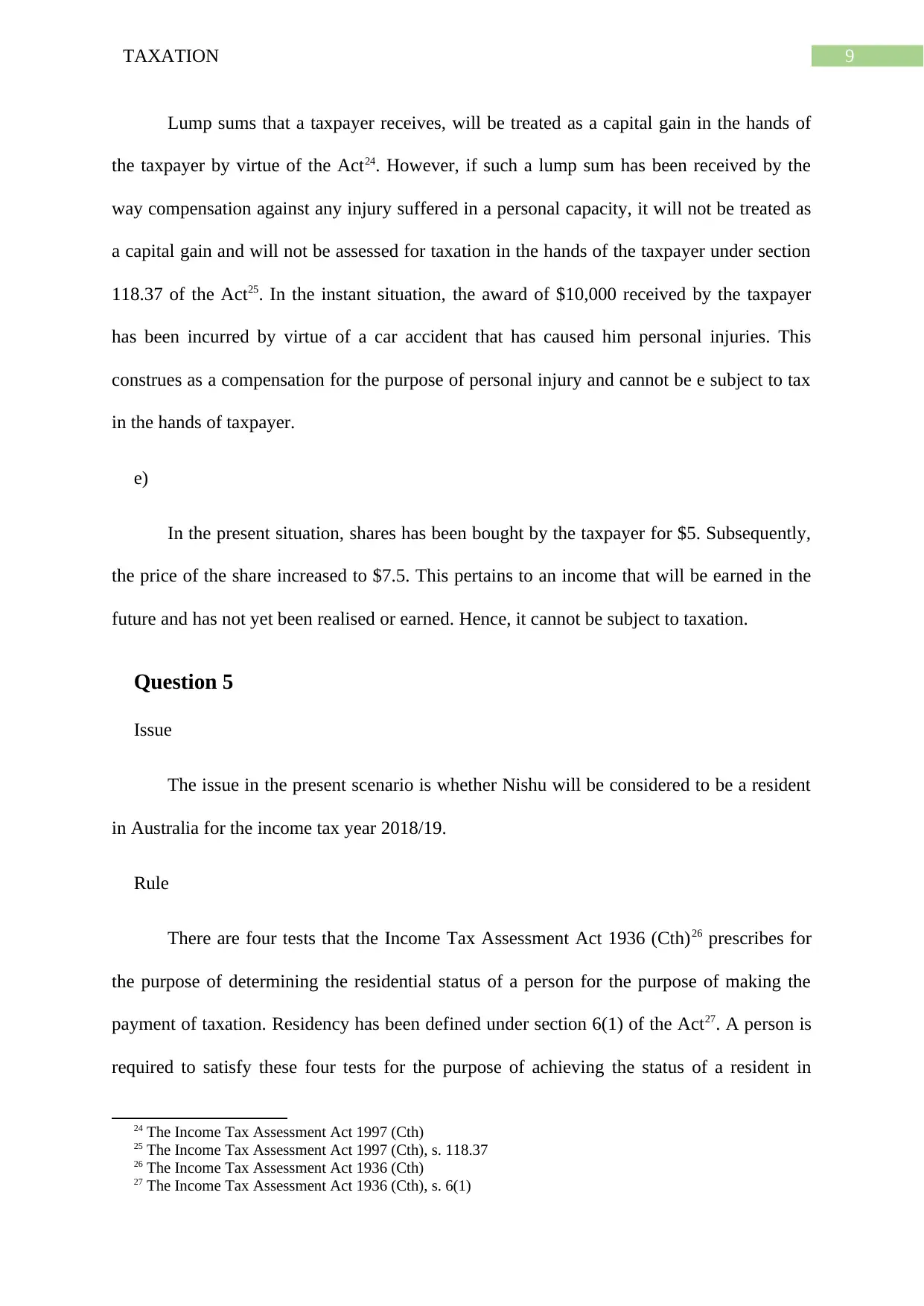
9TAXATION
Lump sums that a taxpayer receives, will be treated as a capital gain in the hands of
the taxpayer by virtue of the Act24. However, if such a lump sum has been received by the
way compensation against any injury suffered in a personal capacity, it will not be treated as
a capital gain and will not be assessed for taxation in the hands of the taxpayer under section
118.37 of the Act25. In the instant situation, the award of $10,000 received by the taxpayer
has been incurred by virtue of a car accident that has caused him personal injuries. This
construes as a compensation for the purpose of personal injury and cannot be e subject to tax
in the hands of taxpayer.
e)
In the present situation, shares has been bought by the taxpayer for $5. Subsequently,
the price of the share increased to $7.5. This pertains to an income that will be earned in the
future and has not yet been realised or earned. Hence, it cannot be subject to taxation.
Question 5
Issue
The issue in the present scenario is whether Nishu will be considered to be a resident
in Australia for the income tax year 2018/19.
Rule
There are four tests that the Income Tax Assessment Act 1936 (Cth)26 prescribes for
the purpose of determining the residential status of a person for the purpose of making the
payment of taxation. Residency has been defined under section 6(1) of the Act27. A person is
required to satisfy these four tests for the purpose of achieving the status of a resident in
24 The Income Tax Assessment Act 1997 (Cth)
25 The Income Tax Assessment Act 1997 (Cth), s. 118.37
26 The Income Tax Assessment Act 1936 (Cth)
27 The Income Tax Assessment Act 1936 (Cth), s. 6(1)
Lump sums that a taxpayer receives, will be treated as a capital gain in the hands of
the taxpayer by virtue of the Act24. However, if such a lump sum has been received by the
way compensation against any injury suffered in a personal capacity, it will not be treated as
a capital gain and will not be assessed for taxation in the hands of the taxpayer under section
118.37 of the Act25. In the instant situation, the award of $10,000 received by the taxpayer
has been incurred by virtue of a car accident that has caused him personal injuries. This
construes as a compensation for the purpose of personal injury and cannot be e subject to tax
in the hands of taxpayer.
e)
In the present situation, shares has been bought by the taxpayer for $5. Subsequently,
the price of the share increased to $7.5. This pertains to an income that will be earned in the
future and has not yet been realised or earned. Hence, it cannot be subject to taxation.
Question 5
Issue
The issue in the present scenario is whether Nishu will be considered to be a resident
in Australia for the income tax year 2018/19.
Rule
There are four tests that the Income Tax Assessment Act 1936 (Cth)26 prescribes for
the purpose of determining the residential status of a person for the purpose of making the
payment of taxation. Residency has been defined under section 6(1) of the Act27. A person is
required to satisfy these four tests for the purpose of achieving the status of a resident in
24 The Income Tax Assessment Act 1997 (Cth)
25 The Income Tax Assessment Act 1997 (Cth), s. 118.37
26 The Income Tax Assessment Act 1936 (Cth)
27 The Income Tax Assessment Act 1936 (Cth), s. 6(1)
Paraphrase This Document
Need a fresh take? Get an instant paraphrase of this document with our AI Paraphraser
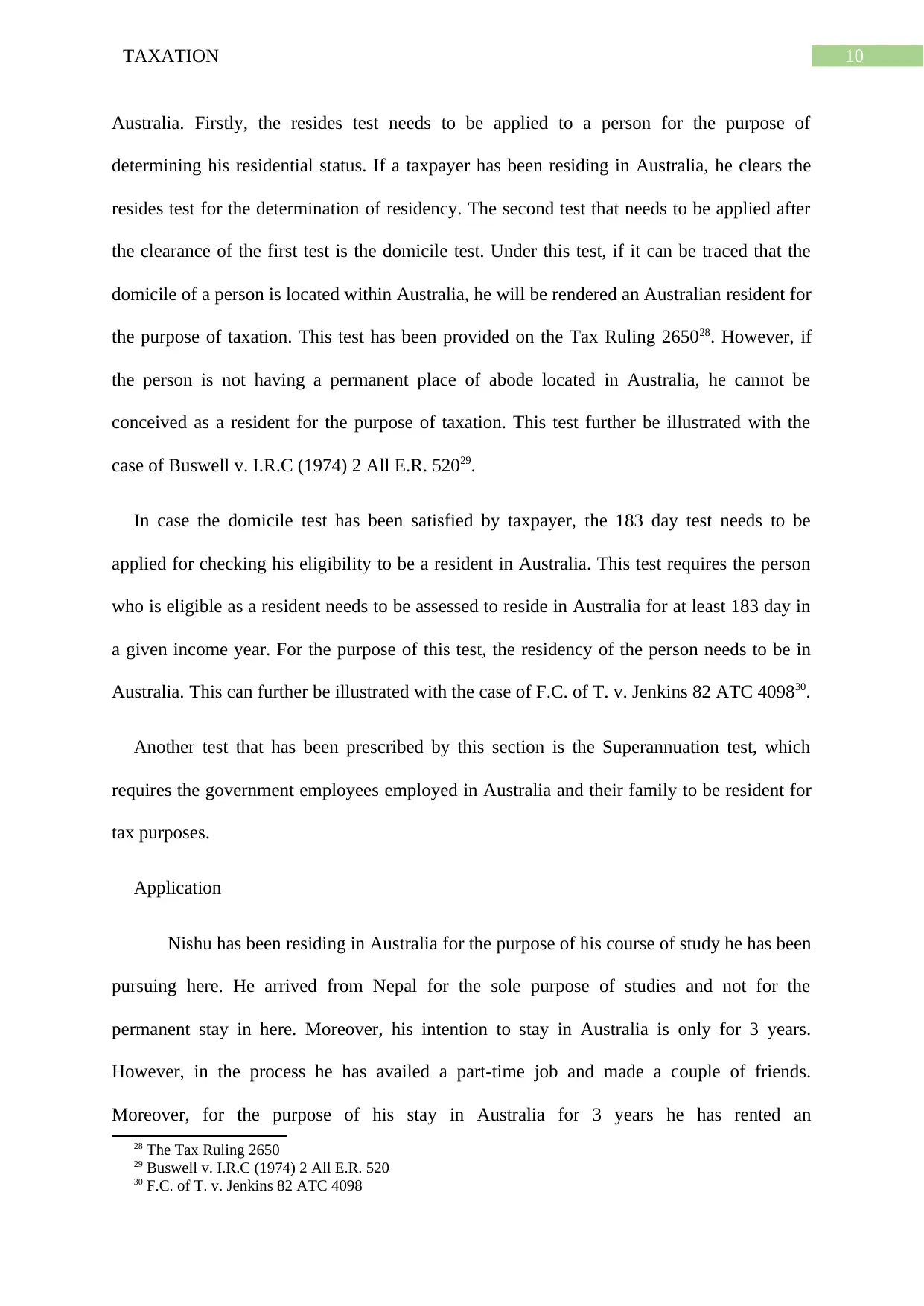
10TAXATION
Australia. Firstly, the resides test needs to be applied to a person for the purpose of
determining his residential status. If a taxpayer has been residing in Australia, he clears the
resides test for the determination of residency. The second test that needs to be applied after
the clearance of the first test is the domicile test. Under this test, if it can be traced that the
domicile of a person is located within Australia, he will be rendered an Australian resident for
the purpose of taxation. This test has been provided on the Tax Ruling 265028. However, if
the person is not having a permanent place of abode located in Australia, he cannot be
conceived as a resident for the purpose of taxation. This test further be illustrated with the
case of Buswell v. I.R.C (1974) 2 All E.R. 52029.
In case the domicile test has been satisfied by taxpayer, the 183 day test needs to be
applied for checking his eligibility to be a resident in Australia. This test requires the person
who is eligible as a resident needs to be assessed to reside in Australia for at least 183 day in
a given income year. For the purpose of this test, the residency of the person needs to be in
Australia. This can further be illustrated with the case of F.C. of T. v. Jenkins 82 ATC 409830.
Another test that has been prescribed by this section is the Superannuation test, which
requires the government employees employed in Australia and their family to be resident for
tax purposes.
Application
Nishu has been residing in Australia for the purpose of his course of study he has been
pursuing here. He arrived from Nepal for the sole purpose of studies and not for the
permanent stay in here. Moreover, his intention to stay in Australia is only for 3 years.
However, in the process he has availed a part-time job and made a couple of friends.
Moreover, for the purpose of his stay in Australia for 3 years he has rented an
28 The Tax Ruling 2650
29 Buswell v. I.R.C (1974) 2 All E.R. 520
30 F.C. of T. v. Jenkins 82 ATC 4098
Australia. Firstly, the resides test needs to be applied to a person for the purpose of
determining his residential status. If a taxpayer has been residing in Australia, he clears the
resides test for the determination of residency. The second test that needs to be applied after
the clearance of the first test is the domicile test. Under this test, if it can be traced that the
domicile of a person is located within Australia, he will be rendered an Australian resident for
the purpose of taxation. This test has been provided on the Tax Ruling 265028. However, if
the person is not having a permanent place of abode located in Australia, he cannot be
conceived as a resident for the purpose of taxation. This test further be illustrated with the
case of Buswell v. I.R.C (1974) 2 All E.R. 52029.
In case the domicile test has been satisfied by taxpayer, the 183 day test needs to be
applied for checking his eligibility to be a resident in Australia. This test requires the person
who is eligible as a resident needs to be assessed to reside in Australia for at least 183 day in
a given income year. For the purpose of this test, the residency of the person needs to be in
Australia. This can further be illustrated with the case of F.C. of T. v. Jenkins 82 ATC 409830.
Another test that has been prescribed by this section is the Superannuation test, which
requires the government employees employed in Australia and their family to be resident for
tax purposes.
Application
Nishu has been residing in Australia for the purpose of his course of study he has been
pursuing here. He arrived from Nepal for the sole purpose of studies and not for the
permanent stay in here. Moreover, his intention to stay in Australia is only for 3 years.
However, in the process he has availed a part-time job and made a couple of friends.
Moreover, for the purpose of his stay in Australia for 3 years he has rented an
28 The Tax Ruling 2650
29 Buswell v. I.R.C (1974) 2 All E.R. 520
30 F.C. of T. v. Jenkins 82 ATC 4098
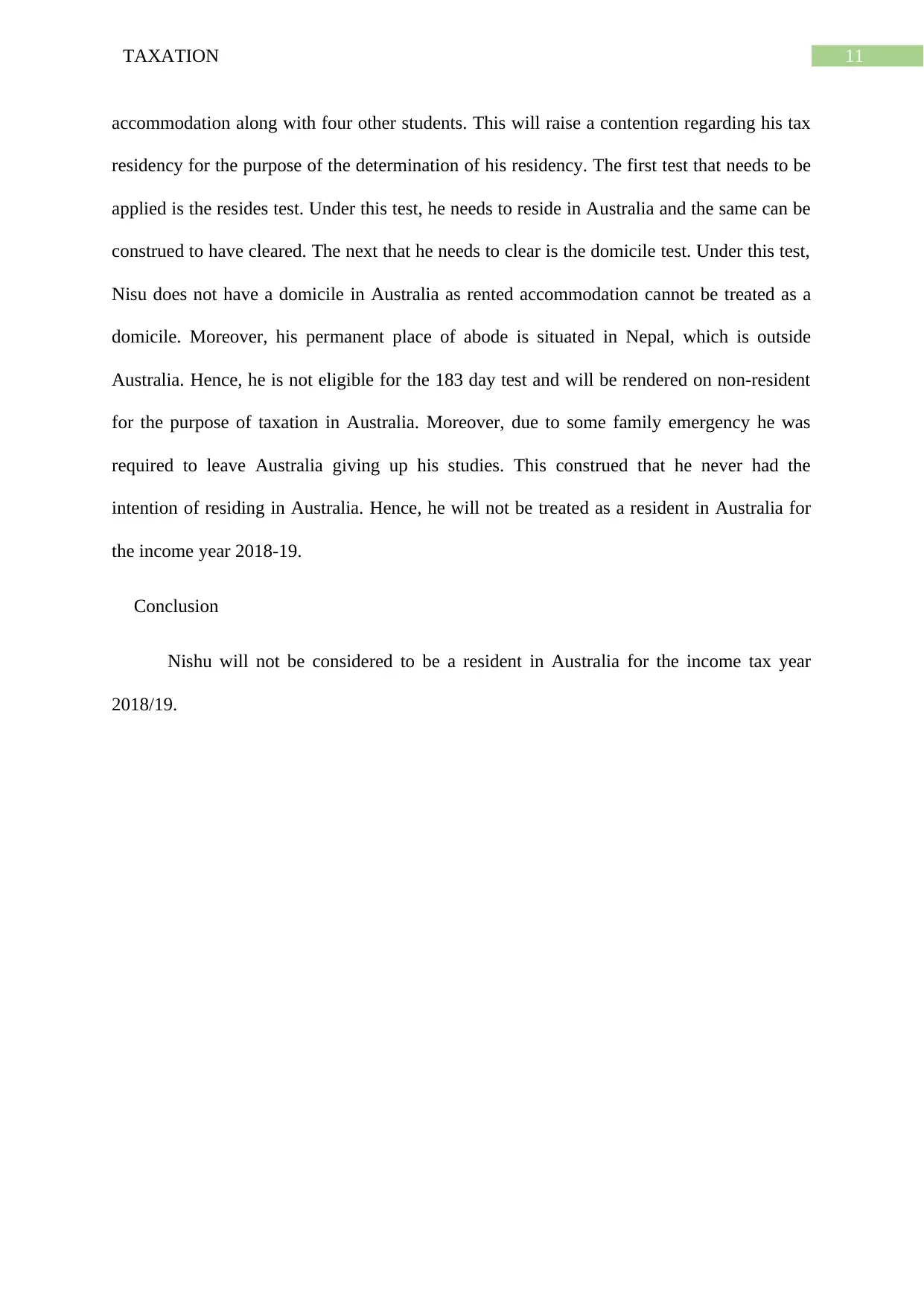
11TAXATION
accommodation along with four other students. This will raise a contention regarding his tax
residency for the purpose of the determination of his residency. The first test that needs to be
applied is the resides test. Under this test, he needs to reside in Australia and the same can be
construed to have cleared. The next that he needs to clear is the domicile test. Under this test,
Nisu does not have a domicile in Australia as rented accommodation cannot be treated as a
domicile. Moreover, his permanent place of abode is situated in Nepal, which is outside
Australia. Hence, he is not eligible for the 183 day test and will be rendered on non-resident
for the purpose of taxation in Australia. Moreover, due to some family emergency he was
required to leave Australia giving up his studies. This construed that he never had the
intention of residing in Australia. Hence, he will not be treated as a resident in Australia for
the income year 2018-19.
Conclusion
Nishu will not be considered to be a resident in Australia for the income tax year
2018/19.
accommodation along with four other students. This will raise a contention regarding his tax
residency for the purpose of the determination of his residency. The first test that needs to be
applied is the resides test. Under this test, he needs to reside in Australia and the same can be
construed to have cleared. The next that he needs to clear is the domicile test. Under this test,
Nisu does not have a domicile in Australia as rented accommodation cannot be treated as a
domicile. Moreover, his permanent place of abode is situated in Nepal, which is outside
Australia. Hence, he is not eligible for the 183 day test and will be rendered on non-resident
for the purpose of taxation in Australia. Moreover, due to some family emergency he was
required to leave Australia giving up his studies. This construed that he never had the
intention of residing in Australia. Hence, he will not be treated as a resident in Australia for
the income year 2018-19.
Conclusion
Nishu will not be considered to be a resident in Australia for the income tax year
2018/19.
⊘ This is a preview!⊘
Do you want full access?
Subscribe today to unlock all pages.

Trusted by 1+ million students worldwide
1 out of 13
Related Documents
Your All-in-One AI-Powered Toolkit for Academic Success.
+13062052269
info@desklib.com
Available 24*7 on WhatsApp / Email
![[object Object]](/_next/static/media/star-bottom.7253800d.svg)
Unlock your academic potential
Copyright © 2020–2026 A2Z Services. All Rights Reserved. Developed and managed by ZUCOL.





